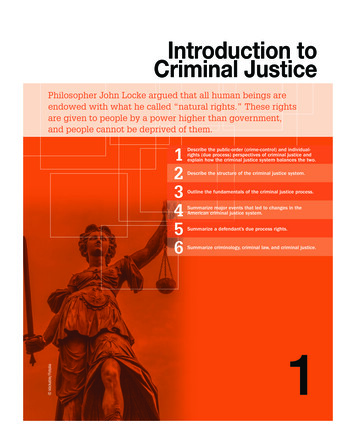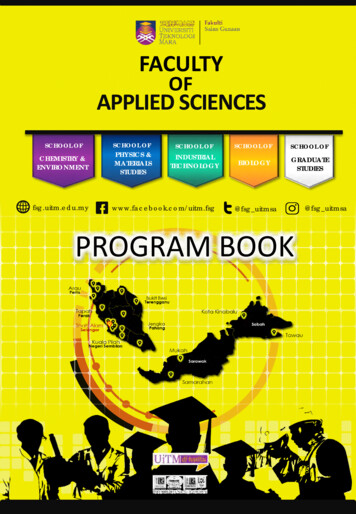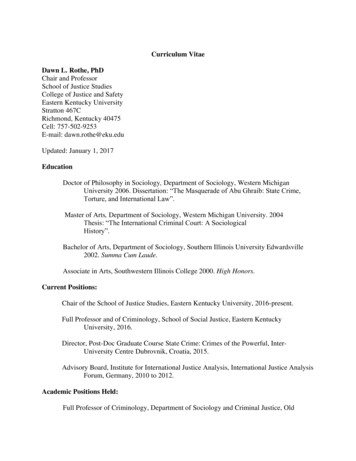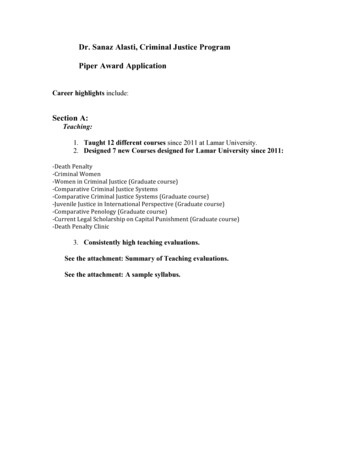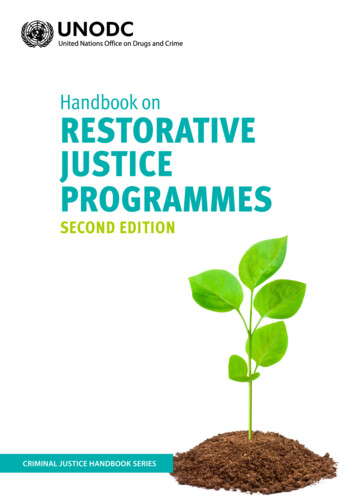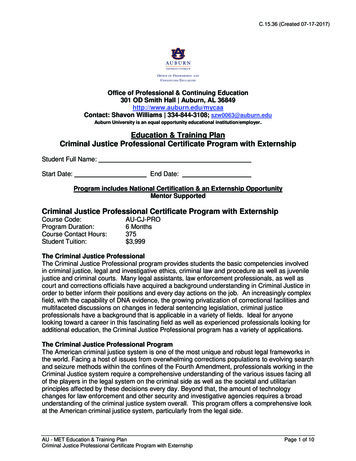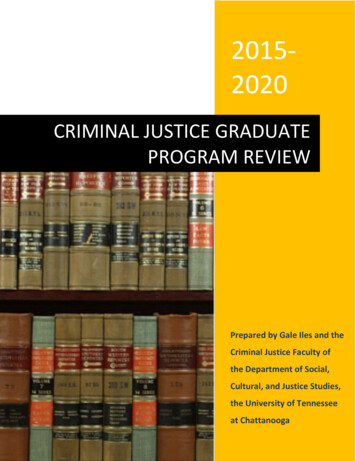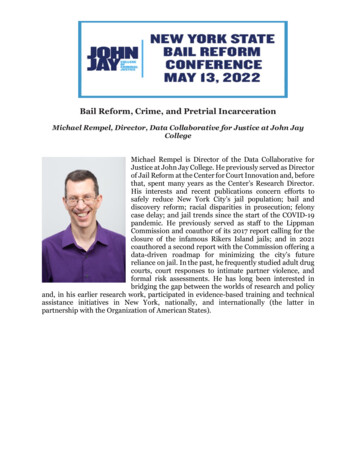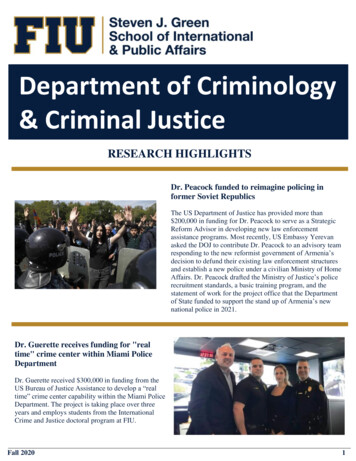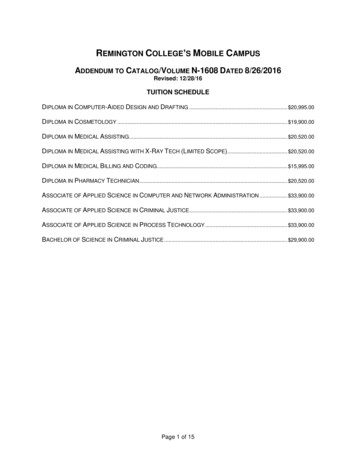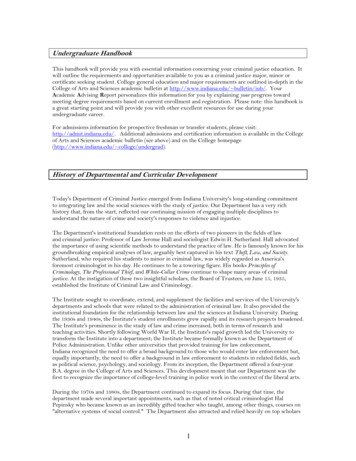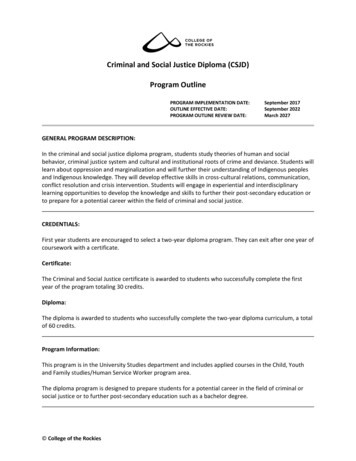
Transcription
Criminal and Social Justice Diploma (CSJD)Program OutlinePROGRAM IMPLEMENTATION DATE:OUTLINE EFFECTIVE DATE:PROGRAM OUTLINE REVIEW DATE:September 2017September 2022March 2027GENERAL PROGRAM DESCRIPTION:In the criminal and social justice diploma program, students study theories of human and socialbehavior, criminal justice system and cultural and institutional roots of crime and deviance. Students willlearn about oppression and marginalization and will further their understanding of Indigenous peoplesand Indigenous knowledge. They will develop effective skills in cross-cultural relations, communication,conflict resolution and crisis intervention. Students will engage in experiential and interdisciplinarylearning opportunities to develop the knowledge and skills to further their post-secondary education orto prepare for a potential career within the field of criminal and social justice.CREDENTIALS:First year students are encouraged to select a two-year diploma program. They can exit after one year ofcoursework with a certificate.Certificate:The Criminal and Social Justice certificate is awarded to students who successfully complete the firstyear of the program totaling 30 credits.Diploma:The diploma is awarded to students who successfully complete the two-year diploma curriculum, a totalof 60 credits.Program Information:This program is in the University Studies department and includes applied courses in the Child, Youthand Family studies/Human Service Worker program area.The diploma program is designed to prepare students for a potential career in the field of criminal orsocial justice or to further post-secondary education such as a bachelor degree. College of the Rockies
Delivery:This program is delivered in a combination of face-to-face and online courses.COTR Credits: 60Hours for this program: 885-915 hoursTypical Structure of Instructional Hours:Instructional ActivityPracticum Hours (if applicable):DurationLecture Hours885-900Type of PracticumDurationOn-the-job ExperienceSeminars / Tutorials0-15Formal Work ExperienceLaboratory / Studio Hours0-15OtherTotalPracticum / Field Experience HoursOther Contact HoursTotal885-915Program Outline Author or Contact:Avery Hulbert, BA Hon, MASignatureAPPROVAL SIGNATURES:Department HeadErin Aasland HallE-mail: aaslandhall@cotr.bc.caDean of Business and University StudiesDarrell BethuneE-mail: bethune@cotr.bc.caDepartment Head SignatureDean SignatureEDCOValid from: September 2022- March 2027Education Council Approval Date College of the RockiesJul. 7, 2022 sk H:\OUTLINE\ProgramOutline\2022 Fall\CSJD.docx2
PROGRAM PREREQUISITES AND TRANSFER CREDIT:Admission Requirements: Secondary school graduation or equivalent. Minimum 65% in either English Studies 12, English First Peoples 12, ENGL 090, or equivalent(refer to Course Equivalency information on the College Website).Flexible Assessment (FA):Credit can be awarded for one or more courses in this program through FA Yes NoLearners may request formal recognition for flexible assessment at the College ofthe Rockies through one or more of the following processes: External Evaluation,Worksite Assessment, Demonstration, Standardized Test, Self-assessment,Interview, Products/Portfolio, Challenge Exam. Contact an Education Advisor formore information.Transfer Credit:For transfer information within British Columbia, Alberta and other institutions,please visit http://www.cotr.bc.ca/TransferStudents should also contact an academic advisor at the institution where theywant transfer credit.PROGRAM GOALS:Selected learning outcomes include the following:The self, community, and society: be aware of personal biases, assumptions and prejudices and demonstrate acceptance forvarying perspectives; develop an awareness of the role media plays in perceptions, myths and fear of crime; have sound introductory knowledge of topical areas of sociology, such as family, religion,economy and work, power, politics and government, social class and stratification, globalstratification and collective behaviour and social change; apply psychological principles to individual and/or social problems; discuss the impact that addiction has on families, communities and society in general; explore Indigenous teachings based on the contributions of Elders, Indigenous scholars andcommunity members; articulate the differences between mainstream and Indigenous family support and childprotection; and understand the strength and cohesion in Indigenous families and communities.Analysis and Communication: complete case study analyses; identify, interpret, and solve problems, effectively implementing and evaluating proposedstrategies; analyze and interpret statistics related to youth crime and the social correlates of youth crime; analyze evidence based prevention, intervention and treatment strategies; develop an argument with a thesis or controlling idea, using appropriate rhetorical patterns andsupporting material for their audience and purpose; College of the RockiesJul. 7, 2022 sk H:\OUTLINE\ProgramOutline\2022 Fall\CSJD.docx3
develop skills to foster intercultural sensitivity;use written and oral communication skills effectively, employing methods appropriate tomessage and context; andactively listen to others.Justice Issues: articulate the differences between the criminal justice system and restorative, community andAboriginal concepts of justice; assess how the concept of law affects decision-making at various levels of the legislative,judicial, and administrative systems; explain the rationale, history and modern structure of the youth criminal justice system inCanada; explain and understand various theoretical explanations (biological, psychological andsociological) of crime and criminals; and explain the fundamental principles of jurisprudence.Working in Organizations: work effectively as a member of a team; develop problem-solving and teamwork skills; recognize the ramifications of stereotypes and culture-based assumptions; adapt to other individuals’ levels of communication; and conduct a case briefing.Managing Conflict: develop skills to prevent vicarious trauma and burnout; demonstrate common conflict resolution strategies and processes; demonstrate resolution models developed specifically for inter-group conflict; illustrate the use of negotiation and mediation skills; and demonstrate basic crisis intervention skills used in an initial crisis intervention, including ethicaland legal considerations.Criminal and Social Justice Diploma program:This program is designed to facilitate maximum transferability to a full degree program after 2 years atCOTR.Program Studies Year OneYear 1 (Criminal and Social Justice Certificate)FallCRIM 101ENGL 100PSYC 101HSWR 211HSWR 212Introduction to CriminologyEnglish CompositionIntroduction to Psychology 1Conflict ResolutionCrisis Intervention College of the RockiesJul. 7, 2022 sk H:\OUTLINE\ProgramOutline\2022 Fall\CSJD.docx333334
WinterCRIM 131CYFS 101SOCI 102COMC 102ElectiveIntroduction to the Criminal Justice SystemInclusive Interpersonal CommunicationsIntroduction to Sociology 2: Social InstitutionsAdvanced Professional CommunicationsChosen from list below:NOTE: Must choose PSYC 102 if completing the diploma program33333One elective from the following:CRIM 103/Psychological Explanations of Criminal and Deviant Behavior (offered inPSYC 103Winter Semester) (for diploma stream, this is required in second yearHSWR 214Introduction to Addictions (offered in Spring Semester) (for diploma stream,this can be an elective in the second year )PSYC 102Diploma stream requires this course be taken in year 1 Winter SemesterProgram Studies Year TwoTotal Credits: 30Year 2 (Criminal and Social Justice Diploma)FallCRIM 135INDG 203INDG 240SOCI 210ElectiveIntroduction to Canadian LawIndigenous Ways of KnowingIndigenous Family support studiesIntroduction to Social Research methodsChosen from list below:One elective from the following:ANTH 101Introduction to Cultural AnthropologyPHIL 101An Introduction to Philosophical Inquiry 1PSYC 240Introduction to Abnormal PsychologySOCI 101Introduction to Sociology 1: The Individual in SocietySTAT 106StatisticsWinterCOMC 253CRIM 210PSYC 103/CRIM 103PSYC 207Elective3333333333Intercultural CommunicationsLaw, Youth and Young OffendersPsychological Explanations of Criminal and Deviant Behaviour333Social PsychologyChosen from list below:33One elective from the following:ENGL 101Introduction to Poetry and DramaENGL 102Introduction to Prose FictionFNST 101First Nations StudiesINDG 105Health and Wellness in Indigenous CommunitiesHIST 211Women in Canada: 1920 to the PresentSTAT 106Introduction to StatisticsHSWR 214Introduction to Addictions (offered in Spring semester) College of the RockiesJul. 7, 2022 sk H:\OUTLINE\ProgramOutline\2022 Fall\CSJD.docx5
Notes:Students intending to complete a degree should complete ENGL 100 plus either ENGL 101 or ENGL 102in their diploma. Please consult the degree-granting institution on its English requirements.Students transferring to VIU after first year must complete CRIM 135 before admission.Total Credits: 60PROGRAM CHANGES:Information contained in this program outline is correct at the time of publication. Courses and coursecontent may be revised from time to time based on changing educational, employment and marketingneeds. The timetable may also be revised.COURSE GRADE:Course grades are assigned as follows:MarkA AA-B BB-C CC-DF 9089-8584-8079-7675-7271-6867-6463-6059-5554-50 50(Percent)A grade of "D" grants credit, but may not be sufficient as a prerequisite for sequential courses.COURSE DESCRIPTIONS can be found on the COTR SharePoint site:http://www.cotr.bc.ca/CourseOutlines/ANTH 101This course involves an in-depth exploration of the concept of culture and the cross-cultural study ofhuman diversity within the discipline of anthropology. Students focus on topics such as anthropologicalresearch, ethics, culture, worldview, gender, language, marriage, families and households, Indigenouspeoples, religion and globalization. Students also engage in self-reflexive examination of their ownworldviews, perceptions and biases in relation to other peoples and cultures.COMC 102This course presents the written and oral communication strategies required in any workplaceenvironment. Students gain practical experience that centers on gathering, summarizing and criticallyassessing information to produce professional documents. Students will also gain a betterunderstanding on how basic design elements enhance the readability of workplace documents andonline communication. This course also focuses on helping students develop speaking skills appropriateto informal and formal presentations and interviews.COMC 253This course explores the inherent relationship between culture, language and communication. The keyconcepts of study are identity, culture, assumptions and stereotypes, beliefs, value systems, andglobalization. From theory to practice, students will investigate the impact of identity and context inintercultural interactions. The focus of this course is to help students develop meaningful strategies tocommunicate in today’s culturally diverse communities. College of the RockiesJul. 7, 2022 sk H:\OUTLINE\ProgramOutline\2022 Fall\CSJD.docx6
CRIM 101This course is an introduction to the major theories, historical, Indigenous and modern, which provideexplanations of crime and criminal behaviour. Various typologies of crime are also explored as well astopics such as crime statistics, crime correlates and trends, crime and the media, fear of crime andvictims of crime.CRIM 103/PSYC 103This course is an introduction to biological, psychiatric, psychological and social/environmentalexplanations of criminal and deviant behaviour. This course explores specific types of behaviours such asviolent offences (homicide), sexual offences and family violence through a psychological lens. Theunique nature and needs of female, youth, Aboriginal and mentally disordered offenders will also beexplored.CRIM 131This course involves a critical examination of the structure and operation of the system that responds tocrime and criminal behaviour: the police, courts and corrections. This course also examines therelationship between these agencies and the impacts and implications of the system. An emphasis isplaced on experiential and interactive learning where students will engage with various individualsinvolved in the system. This course also includes an introduction to Indigenous justice models,community and restorative justice.CRIM 135This course is a general introduction to the principles of jurisprudence and the legal institutions ofCanada. Students will study: Canada's legal systems; the various ways law is made and organized;different explanations and perspectives of law; and its history and role in Canadian society. Students willlearn basic concepts in public and private law, including constitutional, family, criminal, and tort law andwill also learn basic techniques of legal reasoning and research.CRIM 210This course is an analysis of the nature, prevalence, characteristics and consequences of youth crime,deviance and responses to youth crime in Canada. Students examine the social construction of youthcrime and young offenders. The history of youth crime legislations, legal frameworks, theoreticalexplanations and statistics of youth deviance are analyzed.CYFS 101Interpersonal Communications enables the student to develop interpersonal communication skills toenhance their work and personal relationships. We also expect students to clearly evaluate their ownvalues, beliefs, and attitudes that influence their interpersonal communication.ENGL 100English 100 focuses on composition for academic purposes and develops a student’s ability to writeclearly and effectively. Students also learn the fundamentals of critical thinking, persuasive writingtechniques (including rhetorical appeals and devices), scholarly research, and academic reading.ENGL 101An introduction to the critical reading of literature through the study and analysis of poetry and dramaacross historical periods from Shakespeare to twenty-first century poets and dramatists. While thiscourse will teach students how to perform college-level literacy analysis of canonical texts, it will alsoteach students how to question and evaluate the cultural narratives that literature circulates. As such,the class will explore questions of gender, class, race, nationality/nation building, and the problematic College of the RockiesJul. 7, 2022 sk H:\OUTLINE\ProgramOutline\2022 Fall\CSJD.docx7
literary canon in order to develop strategies for negotiating complex literary texts and to become better,more nuanced readers.ENGL 102English 102 introduces students to the genre of literary fiction from the origins of the short story in earlynineteenth century to the novels of twentieth and twenty-first century. The aim of English 102 is toread fiction with an understanding of genre, technique and form; to apply various critical strategies toliterary texts; and to develop analytical writing skills appropriate to essays at the university level.Ultimately, the course encourages students to consider how narrative forms can shape, challenge andrespond to their moral, social, and political contexts.FNST 101This course is an introduction to the multi-disciplinary field of Aboriginal studies. The prehistory, history,and traditional and contemporary cultures of Aboriginals in Canada and their various perspectives areaddressed. Additionally, the historical overview of Aboriginal/non-Aboriginal relations and their effectsare explored.HIST 211This course focuses on a number of important aspects of women's twentieth century experience inintriguing ways. Concepts such as domesticity and motherhood are examined through the study ofmarriage rituals, childrearing practices, and contraceptive methods. The sexual division of labour isanalyzed in terms of women's paid and unpaid work during times like the Second World War.Consumption is examined by looking at shopping habits of the 1950s. Political involvement is measurednot only in the progress women made in becoming persons, but also in becoming feminists. Attemptsare also made to account for the experiences of immigrant and lesbian women.HSWR 211This course is intended to provide students with the basic elements and strategies for coming tomutually acceptable agreements in child, youth, and family related conflicts.HSWR 212This course provides the student with an introduction to the theory and practical day to day proceduresof crisis intervention. Students may be exposed to crisis topics common to a variety of helpingprofession disciplines, including counseling, education, and social work.HSWR 214This course provides the learner with an overview of current practice, theories and models in the field ofsubstance use. Topics include: models of addiction, assessment, intervention and treatment for alcoholand other drug abuse; the impact of substance use on the individual, family and society in general; andethical issues and challenges for practitioners.INDG 105This course adopts a holistic approach to understanding health and wellness within Indigenouscommunities. Students examine many factors and conditions that impact Indigenous community healthfrom a strength based rather than problem focused approach. This course also focuses on Indigenousworldviews in terms of how community health and wellness is articulated and maintained.Traditional knowledge and Indigenous scholarship are incorporated alongside critical Indigenous Studiesperspectives. Whether delivered face to face or online, the course is treated as an interactive lectureseries. Indigenous representatives from local communities and scholars knowledgeable about coursetopics share their valuable insights and knowledge with students. College of the RockiesJul. 7, 2022 sk H:\OUTLINE\ProgramOutline\2022 Fall\CSJD.docx8
INDG 203This course introduces students to concepts of Indigenous traditional knowledge, worldview andepistemology through witnessing Elder teachings, insights from Indigenous scholars and experiences ofIndigenous community members. This course begins with a review of knowledge creation and ways ofknowing. It then explores the value, importance and uniqueness of Indigenous ways of knowing andpedagogy in comparison to Western ways of knowing and pedagogy through exploring questions thatare important to First Nations peoples.INDG 240This course explores the diverse and unique nature and dynamics of First Nations, Aboriginal, Metis andInuit (referred to inclusively as Indigenous) families. Students learn directly from Indigenous families,their support networks and advocates their strengths as well as the challenges and struggles theycontinue to face through the imposed transition from traditional to contemporary family roles. Fromthis, students will work towards fostering a better understanding of how they can assist in providingculturally appropriate family support, and promoting family wellness and safe environments forchildren.PHIL 101Philosophy 101 is designed to introduce students to the questions and ideas in the world of thought andthe skills of moral reasoning. In the context of both classical and contemporary philosophers, the moralprinciples used to justify how we should live are discussed. What are the sources of such principles?What are their limitations? An analysis of various moral traditions will seek to answer Socrates’ timelessethical question, “how ought we to live?”PSYC 101This course provides an introduction to the history, principles, and methods of psychology. Topics mayinclude the brain and behavior, sensation and perception, learning and memory, thinking and language,and states of consciousness.PSYC 102This course is a continuation of Psychology 101. Topics may include development across the lifespan,intelligence, motivation, emotion, stress and health, personality, psychological disorders, therapy, andsocial behavior.PSYC 207This course provides an introduction to the study of human social behavior. Topics include researchmethodology, social cognition, social perception, the self, attitudes, conformity, group processes,interpersonal attraction, prosocial behaviour, aggression, and prejudice.PSYC 240This course is an introduction to the research, history, and theories of abnormal psychology. A majoremphasis in the course is to examine selected categories of psychological disorders such as: anxiety,depression, schizophrenia, personality disorders, eating disorders, and substance abuse. Additionaltopics may include diagnostic classification, the impact of health and stress on psychological functioning,understanding abnormality, and therapies. College of the RockiesJul. 7, 2022 sk H:\OUTLINE\ProgramOutline\2022 Fall\CSJD.docx9
SOCI 101Sociology 101 introduces students to the basic concepts of sociology, while also focusing on therelationship between the individual and society. In addition to theory and research methods, topicalareas include: culture, socialization, media, conformity, social structure and interaction, sex and intimaterelationships, population and urbanization, and globalization. Students will increasingly acquire asociological perspective to enrich their understanding of the social world, especially the vital linkbetween self and society.SOCI 102This course examines the major social institutions and social processes in contemporary society. Asidefrom an introduction to sociology, and an overview of the central theoretical perspectives, special topicsinclude: Family and Intimate Relationships, Education, Religion, Mass Media, Economy and Work,Power, Politics and Government, Social Class and Stratification, Global Stratification, and CollectiveBehaviour, Social Movements and Social Change.SOCI 210Introduction to Social Science Research Methods examines the scientific method applied to theunderstanding of behaviour, the recognition and posing of scientifically researchable questions, and theexamination of different research designs. Students gain an interdisciplinary understanding ofqualitative and quantitative methods and ethics in social science research. Students are introduced torelevant research questions, issues of interest, and how to communicate knowledge and informationabout their social world. This course also introduces Indigenous research methodologies.STAT 106This course introduces the fundamental ideas of statistics and can be applied to any discipline. Topicsinclude: collection, description, and presentation of data; calculating central tendency and dispersion;probability and statistical inference; hypothesis testing (means, proportions, variances, one and twosamples); correlation and regression; decision making and sampling, Goodness of Fit Tests, andContingency Tables. College of the RockiesJul. 7, 2022 sk H:\OUTLINE\ProgramOutline\2022 Fall\CSJD.docx10
Psychological Explanations of Criminal and Deviant Behaviour 3 PSYC 207 Social Psychology 3 Elective Chosen from list below: 3 . . explanations of crime and criminal behaviour. Various typologies of crime are also explored as well as topics such as crime statistics, crime correlates and trends, crime and the media, fear of crime and .
